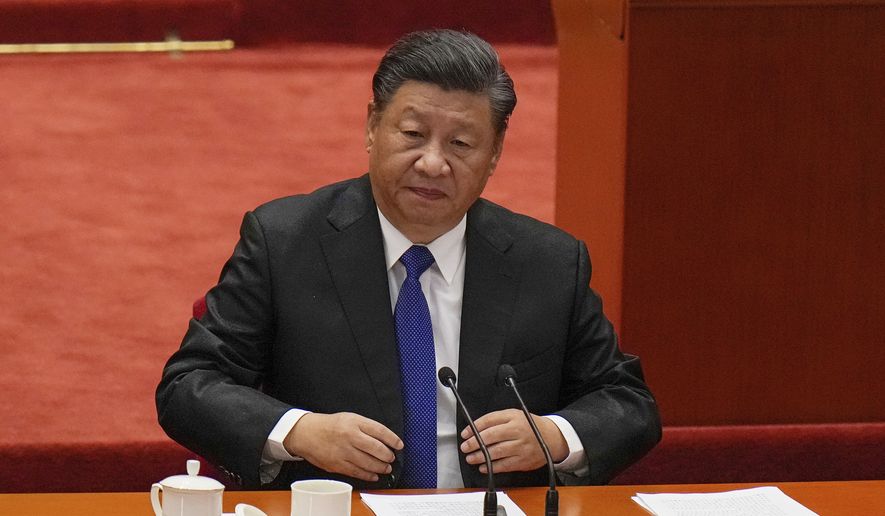Chinese President Xi Jinping on Saturday vowed to retake Taiwan and blamed the decades-long separation of the island state on past Chinese weakness.
In a speech in Beijing’s Great Hall of the People to hundreds of masked Communist Party officials, Mr. Xi said reuniting Taiwan with Communist China remains a long-held goal as part of rejuvenating the nations.
“The Taiwan issue arise from national weakness and chaos,” he said. “It will definitely be resolved with the rejuvenation of the nation.”
Mr. Xi said the division between Taiwan and China should be resolved peacefully but warned that those who betray the motherland and divide the country “never end up well.”
The line drew loud applause from the assembled officials marking the 110th anniversary of the revolution that ended China’s last imperial dynasty in 1911.
“No one should underestimate the Chinese people’s staunch determination, firm will, and strong ability to defend national sovereignty and territorial integrity,” Mr. Xi said. “The historical task of the complete reunification of the motherland must be fulfilled, and will definitely be fulfilled.”
Mr. Xi in a speech in July vowed to “smash” any effort by Taiwan to declare formal independence and in 2019 threatened to use force to reunite the island with the mainland.
The comments about past weakness appeared aimed at President Biden who said Tuesday he had spoken with Mr. Xi about Taiwan and that the Chinese leader agreed to abide by the “Taiwan agreement.”
“We made it clear that I don’t think he should be doing anything other than abiding by the agreement,” Mr. Biden said in response to a question about stepped-up Chinese military intimidation.
Taiwan is a large island state located 100 miles off the coast of China. During a civil war in 1949, Nationalist forces battling the Communists fled to the island and created a government called the Republic of China.
The Taiwan government has remained in an ambiguous status after the administration of President Richard M. Nixon negotiated the formal diplomatic recognition of the Communist government but left unresolved the status of the island whose diplomatic status was downgraded.
U.S.-China ties remain strained over differing interpretations regarding the status of Taiwan within the so-called “one-China policy” outlined in diplomatic communiques.
The Xi speech was delivered days after one of the Chinese military’s most aggressive military provocations, including the dispatch of more than 150 warplanes to areas off the southern coast of Taiwan, including H-6 nuclear-capable bombers.
The State Department said in response to the aerial incursions that prompted Taiwan jet fighters to scramble, it was “very concerned” about the military coercion of Washington’s unofficial ally.
Mr. Xi said “Taiwan independence” poses the greatest obstacle to the reunification of “the motherland” and a “serious hidden danger to national rejuvenation.”
He also criticized what he said is “foreign interference” in Taiwan, an apparent reference to stepped-up U.S. support for Taiwan over the past several years.
“No one should underestimate the strong determination, firm will and strong ability of the Chinese people to defend the sovereignty and territorial integrity of the nation,” Mr. Xi said.
In March, the commander of the Indo-Pacific Command told Congress that there are signs China’s government is speeding up plans to retake Taiwan and that action against the island could take place by 2030.
Four months later, the command’s senior intelligence officer, Rear Adm. Mike Studeman, warned that conflict over Taiwan is coming and said China is already engaged in low-level, information and economic warfare against the island.
“It’s already a struggle underway,” he said. “Whether or not the Chinese resort to a military option is in question. To us, it’s only a matter of time, not a matter of ‘if,’ because if you understand the problem set, you understand that Taiwan will unlikely fold based on economic, and informational and diplomatic influence alone.”
In Taipei, the office of President Tsai Ing-wen responded to the speech by calling on Beijing to halt its coercion and rejected Mr. Xi’s call for reunification under the concept of “one country, two systems.”
“The nation’s future rests in the hands of Taiwan’s people,” the office said.
China agreed to allow Hong Kong to keep its democratic system under the one-country, two systems policy but last year reneged and since has taken control of the former British colony.
• Bill Gertz can be reached at bgertz@washingtontimes.com.




Please read our comment policy before commenting.